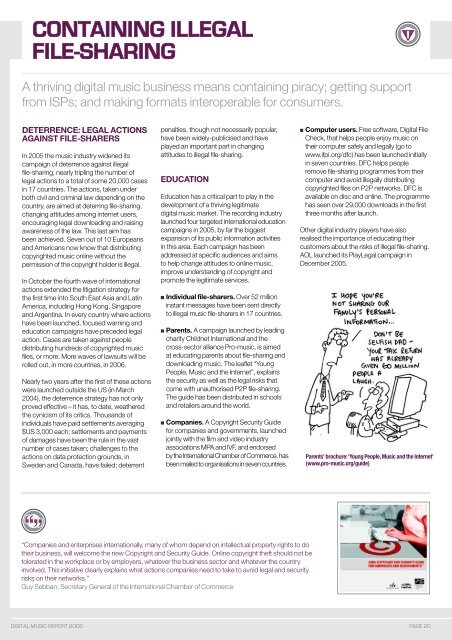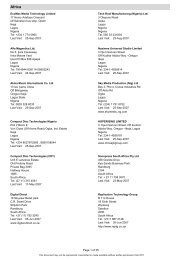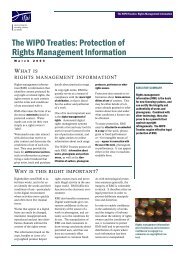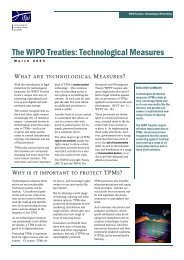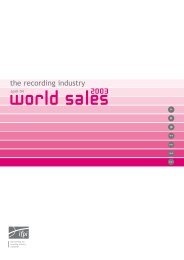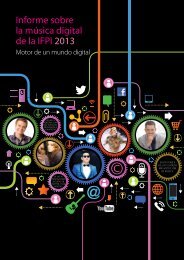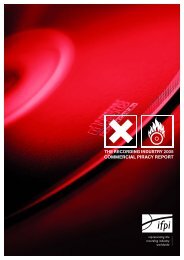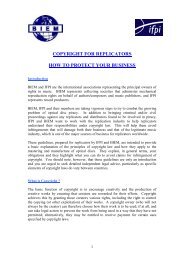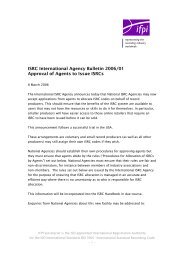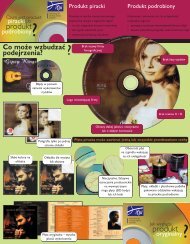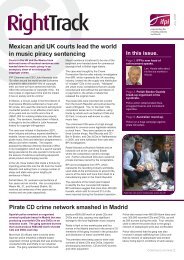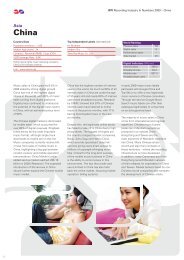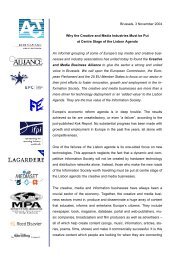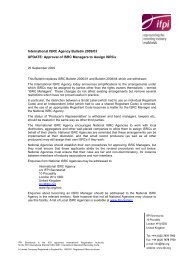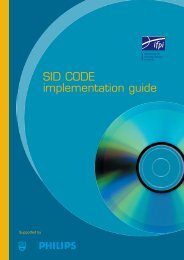2006 - IFPI
2006 - IFPI
2006 - IFPI
You also want an ePaper? Increase the reach of your titles
YUMPU automatically turns print PDFs into web optimized ePapers that Google loves.
CONTAINING ILLEGAL<br />
FILE-SHARING<br />
A thriving digital music business means containing piracy; getting support<br />
from ISPs; and making formats interoperable for consumers.<br />
DETERRENCE: LEGAL ACTIONS<br />
AGAINST FILE-SHARERS<br />
In 2005 the music industry widened its<br />
campaign of deterrence against illegal<br />
file-sharing, nearly tripling the number of<br />
legal actions to a total of some 20,000 cases<br />
in 17 countries. The actions, taken under<br />
both civil and criminal law depending on the<br />
country, are aimed at deterring file-sharing,<br />
changing attitudes among internet users,<br />
encouraging legal downloading and raising<br />
awareness of the law. This last aim has<br />
been achieved. Seven out of 10 Europeans<br />
and Americans now know that distributing<br />
copyrighted music online without the<br />
permission of the copyright holder is illegal.<br />
In October the fourth wave of international<br />
actions extended the litigation strategy for<br />
the first time into South East Asia and Latin<br />
America, including Hong Kong, Singapore<br />
and Argentina. In every country where actions<br />
have been launched, focused warning and<br />
education campaigns have preceded legal<br />
action. Cases are taken against people<br />
distributing hundreds of copyrighted music<br />
files, or more. More waves of lawsuits will be<br />
rolled out, in more countries, in <strong>2006</strong>.<br />
Nearly two years after the first of these actions<br />
were launched outside the US (in March<br />
2004), the deterrence strategy has not only<br />
proved effective – it has, to date, weathered<br />
the cynicism of its critics. Thousands of<br />
individuals have paid settlements averaging<br />
$US 3,000 each; settlements and payments<br />
of damages have been the rule in the vast<br />
number of cases taken; challenges to the<br />
actions on data protection grounds, in<br />
Sweden and Canada, have failed; deterrent<br />
penalties, though not necessarily popular,<br />
have been widely-publicised and have<br />
played an important part in changing<br />
attitudes to illegal file-sharing.<br />
EDUCATION<br />
Education has a critical part to play in the<br />
development of a thriving legitimate<br />
digital music market. The recording industry<br />
launched four targeted international education<br />
campaigns in 2005, by far the biggest<br />
expansion of its public information activities<br />
in this area. Each campaign has been<br />
addressed at specific audiences and aims<br />
to help change attitudes to online music,<br />
improve understanding of copyright and<br />
promote the legitimate services.<br />
n Individual file-sharers. Over 52 million<br />
instant messages have been sent directly<br />
to illegal music file-sharers in 17 countries.<br />
n Parents. A campaign launched by leading<br />
charity Childnet International and the<br />
cross-sector alliance Pro-music, is aimed<br />
at educating parents about file-sharing and<br />
downloading music. The leaflet “Young<br />
People, Music and the Internet”, explains<br />
the security as well as the legal risks that<br />
come with unauthorised P2P file-sharing.<br />
The guide has been distributed in schools<br />
and retailers around the world.<br />
n Companies. A Copyright Security Guide<br />
for companies and governments, launched<br />
jointly with the film and video industry<br />
associations MPA and IVF, and endorsed<br />
by the International Chamber of Commerce, has<br />
been mailed to organisations in seven countries.<br />
n Computer users. Free software, Digital File<br />
Check, that helps people enjoy music on<br />
their computer safely and legally (go to<br />
www.ifpi.org/dfc) has been launched initially<br />
in seven countries. DFC helps people<br />
remove file-sharing programmes from their<br />
computer and avoid illegally distributing<br />
copyrighted files on P2P networks. DFC is<br />
available on disc and online. The programme<br />
has seen over 29,000 downloads in the first<br />
three months after launch.<br />
Other digital industry players have also<br />
realised the importance of educating their<br />
customers about the risks of illegal file-sharing.<br />
AOL launched its PlayLegal campaign in<br />
December 2005.<br />
Parents’ brochure:‘Young People,Music and the Internet’<br />
(www.pro-music.org/guide)<br />
“Companies and enterprises internationally, many of whom depend on intellectual property rights to do<br />
their business, will welcome the new Copyright and Security Guide. Online copyright theft should not be<br />
tolerated in the workplace or by employers, whatever the business sector and whatever the country<br />
involved. This initiative clearly explains what actions companies need to take to avoid legal and security<br />
risks on their networks.”<br />
Guy Sebban, Secretary General of the International Chamber of Commerce<br />
DIGITAL MUSIC REPORT <strong>2006</strong> PAGE 20


